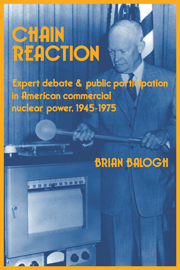 Chain Reaction
Chain Reaction Book contents
- Frontmatter
- Contents
- Acknowledgments
- List of abbreviations
- 1 From fission to fusion: professionalization and politics in twentieth-century America
- 2 The promise of the proministrative state: nuclear experts and national politics, 1945–1947
- 3 Forging an iron triangle: the politics of verisimilitude
- 4 Triangulating demand: the Atomic Energy Commission's first decade of commercialization
- 5 The centrifugal push of expertise: reactor safety, 1947–1960
- 6 The magnetic pull of professional disciplines, issue networks, and local government
- 7 Nuclear experts on top, not on tap: mainstreaming expertise, 1957–1970
- 8 Nuclear experts everywhere: the challenge to nuclear power, 1960–1975
- 9 Conclusion: harnessing political chain reactions
- Index
1 - From fission to fusion: professionalization and politics in twentieth-century America
Published online by Cambridge University Press: 07 May 2010
- Frontmatter
- Contents
- Acknowledgments
- List of abbreviations
- 1 From fission to fusion: professionalization and politics in twentieth-century America
- 2 The promise of the proministrative state: nuclear experts and national politics, 1945–1947
- 3 Forging an iron triangle: the politics of verisimilitude
- 4 Triangulating demand: the Atomic Energy Commission's first decade of commercialization
- 5 The centrifugal push of expertise: reactor safety, 1947–1960
- 6 The magnetic pull of professional disciplines, issue networks, and local government
- 7 Nuclear experts on top, not on tap: mainstreaming expertise, 1957–1970
- 8 Nuclear experts everywhere: the challenge to nuclear power, 1960–1975
- 9 Conclusion: harnessing political chain reactions
- Index
Summary
Expertise has played an increasingly important role in modern American politics. The professions' ability to identify and resolve problems in our complex and interdependent world explains a large part of this phenomenon. Its roots reach back to the mid-nineteenth century. In his perceptive study of the emergence of social science as a profession, Thomas Haskell portrayed the demise of traditional deference to classical professions such as law, medicine, and the clergy in the Gilded Age. Professionals who recognized that social and economic disruptions stemmed from America's rapidly increasing interdependence – not, for instance, from character flaws – could reconstitute lost authority or grasp it for the first time. Recognizing that solutions to problems caused by immigration, urbanization, and industrialization depended on the management of complex factors that on the surface might seem unrelated to the problem, the modern professions developed powerful and appealing diagnoses: particularly in medicine, prescriptions soon followed. What disparate disciplines shared was their technique of problem solving – an approach grounded in specialization. Those professions sufficiently specialized to root out the hidden cause of a problem and treat its more explicit consequences earned back the authority lost with the demise of a more tradition-bound society.
This response to interdependence stimulated more forceful professional organization, while the quest for order and control simultaneously spurred increasingly hierarchical and specialized organization in the public sector. Politics at the start of the twentieth century had already begun a long transition away from torchlight parades, 90 percent voter participation rates, and strong partisan ties of the previous century.
- Type
- Chapter
- Information
- Chain ReactionExpert Debate and Public Participation in American Commercial Nuclear Power 1945–1975, pp. 1 - 20Publisher: Cambridge University PressPrint publication year: 1991


